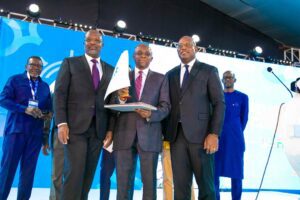


PIA: NUPRC inaugurates forum for host communities
The Nigerian Upstream Petroleum Regulatory Commission (NUPRC) has inaugurated the Host Community Development and Administration Trust Board of Trustees (BOT) Forum.
The exercise held at the Commission’s headquarters in Abuja and was witnessed by top management staff of the Commission, Host Community leaders, settlors and stakeholders.
The Commission Chief Executive (CCE), Engr. Gbenga Komolafe, who inaugurated the forum, said it became imperative because there was the need for not just a one-stop-shop for resolving host communities’ issues but a vehicle that would enable the smooth administration of the host community provisions of the Petroleum Industry Act (PIA), 2021.
He said it was another initiative of the Commission that would add value to the successes recorded in the host Community provisions in the Act.
Engr. Komolafe said in compliance with Sections 232 and 235 of the PIA, which provides for implementing the Host Community Development Trust (HCDT), NUPRC has incorporated one hundred and three (103) Trusts.
“This is because of the Commission’s priority on social inclusion, which is one of the key objectives of the Host Comm provisions under the PIA, with the belief that social inclusion is and will be the recipe for peace and harmony that will enhance the operations of the oil industry,” he added.
Given the realisation that a peaceful and harmonious operating environment can enhance production in the host communities, the CCE said the Commission focused attention on developing host community regulations, among other key regulations the Commission has so far handled. It was also the reason why the Commission brought up the HDCT Board of Trustees so that there could be, aside from other benefits, a Rule of Uniform Application as part of the developmental objectives provided under the PIA, 2021.
Engr. Komolafe pointed out that from the outset, the Commission had decided to implement the HostCom provisions transparently. For efficiency and effectiveness of the scheme’s implementation, the Commission partnered with an Original Equipment Manufacturer (OEM) to develop a transparent real-time digital portal/reporting system, known as HOSTCOMPLY, where administration of the scheme will be reported. The HOSTCOMPLY portal is a comprehensive solution designed to facilitate compliance with the Host Communities Development provisions of the Act, which functions include the incorporation application process, request for approvals, submission of reports and project monitoring.
Having learned from past attempts to implement this type of scheme in the country, the key objective of this vital scheme is transparent implementation using a digital approach, Engr. Komolafe added.
For a seamless implementation and achievement of the intended objective, the Commission intends to ensure capacity building for BOT members to enable proper understanding and implementation of this initiative. By the time the scheme is fully implemented, all stakeholders should be able to follow progress most transparently.
To drive the transparency objective, the Commission invited the OEM development expert who designed the digital portal, Prof. Magnus Kpakol, Executive Chairman of the Economic Growth and Development Centre, to share his knowledge and expertise with the board members in a manner that would ensure that the provision for HostCom in the PIA is effectively realised.
In his opening remarks, the Executive Commissioner, Health, Safety, Environment and Community (HSEC), Captain John Roland Tonlagha, said that the forum is a platform for engagement between BOT, settlors and host communities.
He explained that the forum enhances accountability and transparency since effective development requires careful planning and strategic decision-making.
“The forum also serves as a space where stakeholders collectively access the operationalisation of the Host Community Development Trust. So, through informed discussions and exchange of ideas, the BOT can make decisions that align with the goal and aspiration of the PIA for the Host Community Development Trust.
He hoped that the Trust would operate within the ambits of the law and, through constructive dialogue facilitated by the HCDT Forum, deliver tangible results to the communities it serves.
The acting Director of Host Communities, Mrs. Ejiro Ofondu, also gave a status report on the implementation of the HCDT.
According to the report, by Thursday, February 22, 2024, thirty-five (35) settlors had sent their applications to the Commission for the incorporation of HCDT. One hundred and sixty (160) of such applications have been received and attended to, while (one hundred and eleven (111) have been approved to be incorporated by the Corporate Affairs Commission (CAC).
Out of the one hundred and eleven (111), one hundred and three (103) have completed the entire process and have been fully incorporated. Fifty-two (52) have so far been funded. Currently, forty-three (43) applications are still in the pipeline; some are under review, and some are under litigation.



